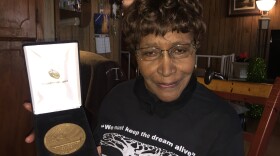Tens of thousands of people are expected to gather Saturday at the Lincoln Memorial in the nation's capital to commemorate the 60th anniversary of the Rev. Martin Luther King Jr.'s "I Have A Dream" speech. The original march in 1963 drew as many as 250,000 people and helped till the ground for passage of federal civil rights and voting rights legislation in the next few years. Alabama came next.
Two weeks later in 1963, four Black girls were killed in the 16th Street Baptist Church bombing in Birmingham, Alabama, followed by the kidnapping and murder of three civil rights workers in Neshoba County, Mississippi the following year. The tragedies spurred passage of the Civil Rights Act of 1964.
And the voting rights marches from Montgomery to Selma, Alabama, in which marchers were brutally beaten while crossing the Edmund Pettus Bridge in what became known as "Bloody Sunday," forced Congress to adopt the Voting Rights Act of 1965.
On Friday, Martin Luther King III, who is the late civil rights icon's eldest son, and his sister, Bernice King, each visited their father's monument in Washington.
"I see a man still standing in authority and saying, 'We've still got to get this this right,'" Bernice said as she looked up at the granite statue.
The original march, which featured their father as a centerpiece, helped till the ground for passage of federal civil rights and voting rights legislation in the 1960s.
Organizers of this year's commemoration hope to recapture the energy of the original March on Washington – especially in the face of eroded voting rights nationwide, after the recent striking down of affirmative action in college admissions and abortion rights by the Supreme Court, and amid growing threats of political violence and hatred against people of color, Jews and the LGBTQ community.
"What we know is when people stand up, the difference can be made," Martin Luther King III told The Associated Press in an interview ahead of Saturday. "This is not a traditional commemoration. This really is a rededication."
The event kicks off with pre-program speeches and performances at 8:00 a.m. ET. The main program begins at 11 a.m. ET., followed by a march procession that will begin through the streets of Washington toward the Dr. Martin Luther King, Jr. Memorial.
Featured speakers include Ambassador Andrew Young, the close King adviser who helped organize the original march and who went on to serve as a congressman, U.N. ambassador and mayor of Atlanta. Leaders from the NAACP and the National Urban League are also expected to give remarks.
Several leaders from groups organizing the march met Friday with Attorney General Merrick Garland and Assistant Attorney General Kristen Clarke of the civil rights division, to discuss a range of issues, including voting rights, policing and redlining.
The gathering Saturday is a precursor to the actual anniversary of the Aug. 28, 1963 March on Washington. President Joe Biden and Vice President Kamala Harris will observe the march anniversary on Monday by meeting with organizers of the 1963 gathering. All of King's children have been invited to meet with Biden, White House officials said.
For the Rev. Al Sharpton, founder of the National Action Network, continuing to observe March on Washington anniversaries fulfills a promise he made to the late King family matriarch Coretta Scott King. Twenty three years ago, she introduced Sharpton and Martin Luther King III at a 37th anniversary march and urged them to carry on the legacy.
"I never thought that 23 years later, Martin and I, with Arndrea, would be doing a march and we'd have less (civil rights protections) than we had in 2000," Sharpton said.
"We're fulfilling the assignment Mrs. King gave us," he said. "We are having to march, saying we can't go backwards, and we've got to go forward."
Coming out of the march on Saturday, Sharpton says he will lead a voting rights tour in the fall in states that are trying to erect barriers ahead of the 2024 presidential election. He also plans to meet with major Black entrepreneurs to create a fund to finance the fight against conservative attacks on diversity and inclusion initiatives.
Bernice King, said she sympathized with those who have grown weary over the continued fight to preserve civil rights. But they need to remember her mother's words, in addition to her father's famous speech, she said.
"Mother said, struggle is a never ending process," said Bernice, who is CEO of the Martin Luther King, Jr. Center For Nonviolent Social Change, which was founded by her mom after the civil rights icon's assassination in 1968.
"Freedom is never really won – you earn it and win it in every generation. Vigilance is the answer," she said. "We have to always remember, it's difficult and dark right now, but a dawn is coming."
Her father's March on Washington remarks have resounded through decades of push and pull toward progress in civil and human rights. But dark moments followed his speech, too.
"Unfortunately, we're living in a time when there's a younger generation who believes that my daddy's generation, and those of us who came after, didn't get enough done," Bernice King said. "And I want them to understand, you are benefiting and this is the way you're benefiting."
She added: "We can't give up, because there's a moment in time when change comes. We have to celebrate the small victories. If you're not grateful, you will undermine your progress, too."








